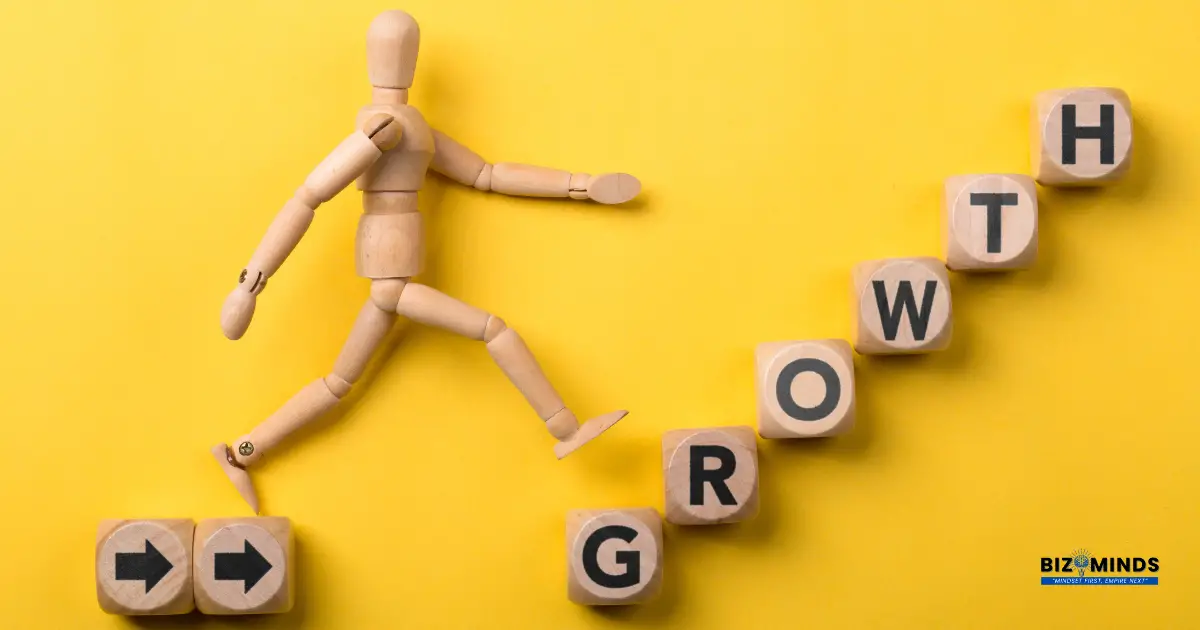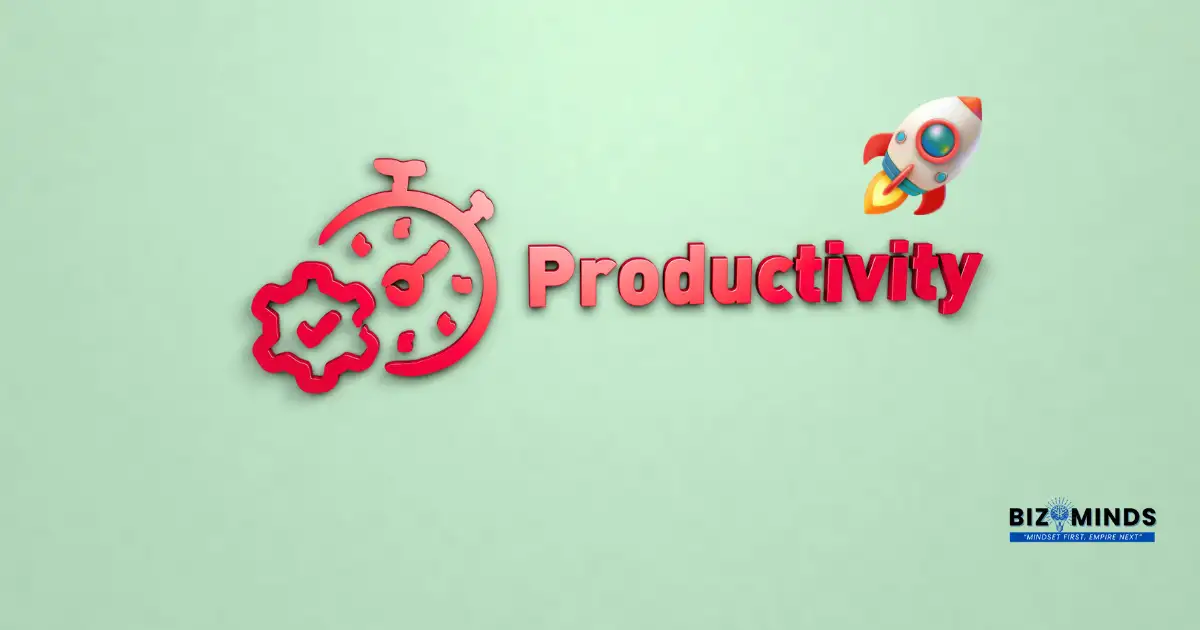
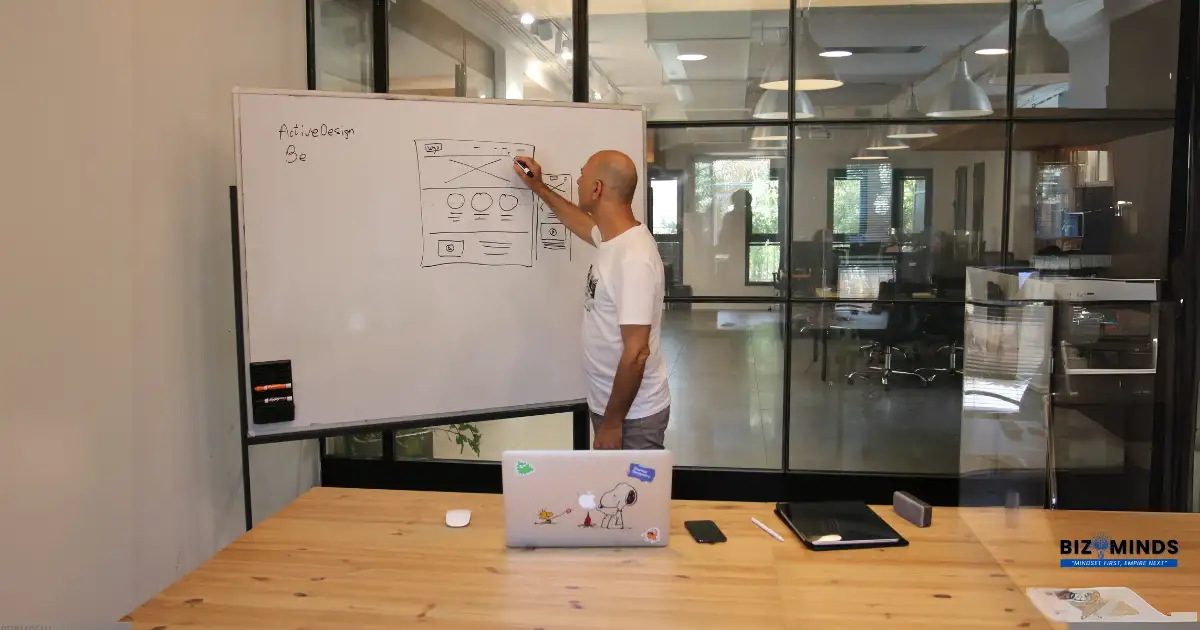
The Entrepreneur’s Guide to Personal Growth: Essential Self-Improvement Books That Transform Business Leaders
The entrepreneurial landscape in America has never been more vibrant—or more fiercely competitive. With a remarkable 5.5 million new businesses founded in 2023, representing an extraordinary 56.7% surge from 2019, the United States continues to be the world’s ultimate breeding ground for innovation and business ambition. But beneath every household-name brand and each inspiring new startup, one common thread connects these remarkable journeys: a steadfast commitment to self-improvement.
Iconic individuals such as Tim Cook, who is known for starting his day at 4:30 AM to enhance productivity and learning, and Oprah Winfrey, who rose from poverty to build a media empire valued at around $3 billion and inspire millions, embody this quality. These luminaries—and countless others whose names fill Forbes lists and startup boards—know that in a nation where change is the only constant, self-improvement isn’t a luxury; it’s a non-negotiable catalyst for entrepreneurial success.
Americans are embracing this imperative at unprecedented levels. The US personal development market reached $15.99 billion in 2023 and is projected to grow to $27 billion by 2030, underscoring America’s strong commitment to personal growth, self-improvement, learning, and transformational development. At the heart of this movement lies the written word: personal development book sales have climbed at an impressive 11% compound annual growth rate, reaching 18.6 million copies sold in 2019 alone. This surge reflects an unmistakable truth—America’s entrepreneurs are investing in self-improvement with unmatched passion, translating new knowledge into bold innovations and business success.
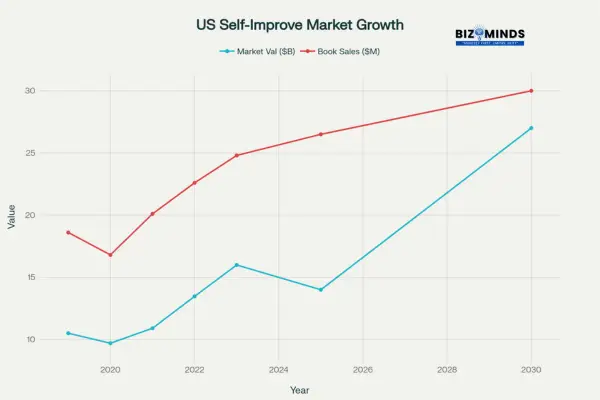
US Self-Improvement Market Growth: Trends in Market Value and Book Sales from 2019 to 2030
In today’s world, where every competitive edge counts, those who relentlessly pursue self-improvement are not just setting themselves up for personal growth—they’re defining the future of American entrepreneurship.
The Foundation: Building an Unshakeable Entrepreneurial Mindset for Self-Improvement
The Growth Mindset Revolution
At the heart of every successful entrepreneur lies a mindset primed for growth and resilience. Stanford psychologist Carol Dweck’s revolutionary research on fixed versus growth mindsets has become a cornerstone in the world of entrepreneurship and self-improvement. Her seminal book, “Mindset: The New Psychology of Success,” reveals a profound truth—entrepreneurs who embrace a growth mindset consistently outperform their peers by viewing failures and setbacks not as proof of inadequacy but as essential stepping stones to mastery and innovation.
Take, for example, Jeff Bezos, whose early days at Amazon were marked by enduring widespread skepticism about his vision. Bezos famously asserted that Amazon’s willingness to be misunderstood for long periods fueled its aggressive innovation and expansion beyond just an online bookstore to becoming the everything store we know today. This kind of resilience and openness to learning exemplifies the growth mindset—seeing challenges not as threats but as essential opportunities for self-improvement and business evolution. Such a mindset isn’t just desirable—it’s indispensable in the fast-moving American entrepreneurial ecosystem.
Developing Mental Resilience: The Role of Self-Improvement in Overcoming Challenges
While many traditional development books advocate relentless positivity, Mark Manson’s “The Subtle Art of Not Giving a Fck”* provides entrepreneurs with a refreshing and necessary reality check that can deepen self-improvement. His core principle—that emotional energy is finite, and therefore, you must learn to choose your battles wisely—strikes a chord, especially in America’s fast-paced business climate, where entrepreneurs face constant decision fatigue and information overload.
Similarly, Brianna Wiest’s book The Mountain Is You addresses the frequently neglected topic of self-sabotage. It offers entrepreneurs and business-leaders profound insights into how unconscious mental barriers can thwart success and provides actionable frameworks for recognizing and overcoming these internal obstacles. These books strengthen the core of self-improvement by guiding entrepreneurs through the psychological challenges that traditional advice frequently overlooks.
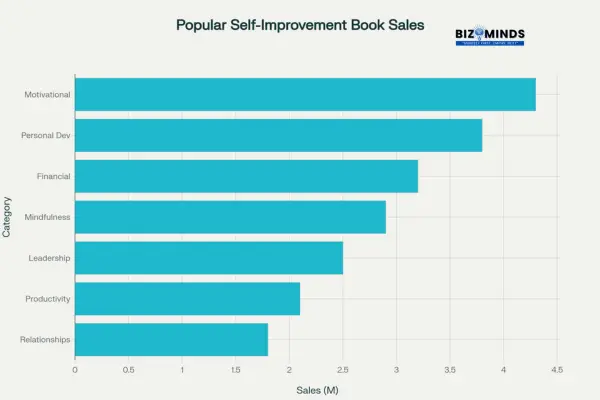
Top Self-Improvement Book Categories by Sales Volume (Millions of Units)
Mastering Productivity: Self-Improvement Systems That Scale Entrepreneurial Success
Building Atomic Habits: Practical Self-Improvement for Sustainable Productivity
For American entrepreneurs striving for incremental yet lasting change, James Clear’s “Atomic Habits” has become the definitive guide to productivity and personal transformation. Its philosophy of seeking tiny, 1% daily improvements resonates deeply with the culture of relentless self-improvement that defines entrepreneurial success in the U.S.
Consider Tony Robbins, whose speaking empire grew from a series of small, consistent refinements to his craft. Clear’s methodology of habit stacking—linking new positive habits to existing routines—allows busy entrepreneurs to build sustainable, game-changing systems without overwhelming their already jam-packed lives. This approach transforms self-improvement from a daunting goal into a manageable, daily practice.
Deep Work in the Digital Age
In an era where distractions are ubiquitous, Cal Newport’s “Deep Work” addresses arguably the modern entrepreneur’s most daunting challenge: sustaining focused, undistracted work in an attention economy. Leading Silicon Valley executives and prominent American entrepreneurs have embraced Newport’s strategies for establishing distraction-free environments, enabling them to tackle complex challenges and drive innovative breakthroughs.
Data suggests that Fortune 500 CEOs dedicate roughly 30 minutes each day to self-improvement activities like focused reading or skill-building, while only about 25 minutes are spent specifically on strategy and planning. This underscores Newport’s core argument that depth of work—quality and intensity—is often more valuable than sheer quantity.
The Getting Things Done System
David Allen’s “Getting Things Done” presents a comprehensive system for taming the flood of information and action steps that overwhelm today’s entrepreneurs. Its emphasis on capturing all commitments and tasks into a trusted external system resonates deeply within the American entrepreneurial mindset, where juggling multiple projects and demands is the norm.
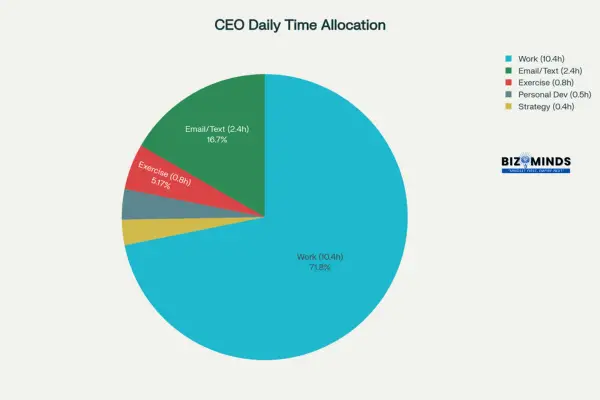
Fortune 500 CEO Daily Time Allocation: How Top Leaders Structure Their Day for Self-Improvement
Leadership Excellence: Achieving Visionary Growth Through Self-Improvement
Character-Based Leadership
Stephen Covey’s “The 7 Habits of Highly Effective People” remains an unparalleled classic in leadership development for American entrepreneurs. Its principle-centered approach shapes leaders who balance daily operational demands with long-term vision, a balance vital for sustained business success.
From Sam Walton, the founder of Walmart, whose insistence on beginning with the end in mind revolutionized retail, to modern tech leaders steering disruptive innovation, Covey’s habits serve as a timeless blueprint for self-improvement and leadership excellence.
Emotional Intelligence in Business
The importance of emotional intelligence (EQ) within entrepreneurial leadership cannot be overstated, with research indicating that EQ accounts for 58% of job performance across industries. Travis Bradberry and Jean Greaves’ “Emotional Intelligence 2.0” equips entrepreneurs with practical tools to enhance self-awareness, empathy, and interpersonal skills—key drivers of competitive advantage in business.
Oprah Winfrey personifies the power of EQ, having leveraged her authentic connection with audiences to build a media empire that is as emotionally resonant as it is financially successful.
Embracing Vulnerability: Self-Improvement as a Leadership Strength
Brené Brown’s Daring Greatly transforms the concept of leadership by highlighting vulnerability as a vital strength rather than a perceived weakness. For American entrepreneurs navigating uncertainty and the pressures of leadership, this vulnerability fosters trust and authenticity within teams and customer relationships.
Richard Branson’s openness about his struggles with dyslexia and business failures has only bolstered his credibility and influence. His approach exemplifies how vulnerability has become a sought-after leadership trait in American business culture, where authenticity and emotional connection increasingly matter.
Strategic Thinking: Building Businesses That Last
The Lean Revolution
Eric Ries’s “The Lean Startup” fundamentally changed how American entrepreneurs approach business building. The build-measure-learn methodology has become standard practice in Silicon Valley and beyond, enabling entrepreneurs to validate ideas quickly while minimizing waste.
The book’s influence extends to Fortune 500 companies, with General Electric and Intel adopting lean startup principles for internal innovation projects. This cross-pollination between startup methodology and corporate innovation demonstrates the universal applicability of Ries’s framework.
Zero to One: Self-Improvement for Innovative Thinking and Market Leadership
Peter Thiel’s “Zero to One” challenges entrepreneurs to create monopolies through innovation rather than compete in crowded markets. Thiel’s contrarian thinking helped him co-found PayPal and become the first outside investor in Facebook.
The book’s emphasis on vertical progress—creating something entirely new—rather than horizontal progress—copying existing solutions—aligns with America’s innovation-driven economy. This thinking has influenced a generation of entrepreneurs to pursue breakthrough innovations rather than incremental improvements.
Navigating Hard Decisions
Ben Horowitz’s “The Hard Thing About Hard Things” provides entrepreneurs with frameworks for making difficult decisions under pressure. Drawing from his experience building and leading companies during the dot-com crash, Horowitz offers practical advice for managing through crisis.
The book’s unflinching look at leadership challenges resonates with American entrepreneurs who must make tough decisions while maintaining team morale and investor confidence. Horowitz’s emphasis on transparent communication and decisive action has become a blueprint for crisis leadership.
Communication and Relationship Building
Timeless Relationship Principles
Dale Carnegie’s How to Win Friends and Influence People continues to be highly relevant and valuable for today’s entrepreneurs. The book’s principles for building genuine relationships have helped countless American business leaders expand their networks and influence.
Reid Hoffman, LinkedIn’s founder, credits Carnegie’s relationship-building principles with helping him understand the value of professional networking. This understanding became the foundation for LinkedIn’s business model and Hoffman’s success as both an entrepreneur and venture capitalist.
Strategic Networking
Keith Ferrazzi’s “Never Eat Alone” updates Carnegie’s relationship principles for the modern business environment. The book’s emphasis on creating mutual value in relationships rather than transactional networking has become essential reading for American entrepreneurs.
The networking strategies outlined in Ferrazzi’s book have particular relevance in America’s relationship-driven business culture, where personal connections often determine access to funding, talent, and partnership opportunities.
Purpose-Driven Leadership
Simon Sinek’s “Start With Why” has transformed how American entrepreneurs communicate their vision. The book’s golden circle framework—starting with why rather than what or how—has helped leaders build more engaged teams and loyal customer bases.
Apple’s transformation under Steve Jobs exemplifies Sinek’s principles. By focusing on why Apple exists (to challenge the status quo and think different) rather than what it makes (computers and phones), Jobs created one of America’s most valuable companies.
Financial Intelligence and Acumen: Self-Improvement Foundations for Fiscal Success
Entrepreneurial Financial Management
Understanding financial statements and making data-driven decisions separate successful entrepreneurs from those who struggle. Karen Berman’s “Financial Intelligence for Entrepreneurs” provides non-financial business leaders with the tools they need to understand and use financial information effectively.
The book’s practical approach to financial analysis has helped countless American entrepreneurs make better investment decisions and communicate more effectively with investors and board members.
Wealth-Building Fundamentals
George S. Clason’s The Richest Man in Babylon presents enduring financial lessons through ancient parables. Though written many years ago, its key teachings—such as paying yourself first, living within your means, and making smart investments—continue to serve as essential guidelines for entrepreneurial financial success.
Many American entrepreneurs, including Warren Buffett, cite this book as influential in shaping their approach to wealth building and business investment decisions.
Systems Thinking in Business
Michael Gerber’s “The E-Myth Revisited” addresses a critical challenge facing American entrepreneurs: the difference between working in your business and working on your business. Gerber’s systematic approach to business building has helped countless entrepreneurs scale beyond their personal capacity.
The book’s emphasis on creating systems and processes that operate independently of the founder resonates particularly with American entrepreneurs who aspire to build businesses that can operate and grow without their constant involvement.
Personal Excellence and Peak Performance
Morning Rituals for Success
Robin Sharma’s “The 5 AM Club” capitalizes on the American entrepreneurial fascination with morning routines. The book’s structured approach to early rising and morning optimization aligns with the habits of successful leaders like Tim Cook and Anna Wintour.
Research from Harvard Business Review confirms that successful CEOs average wake-up times of 6:15 AM, with many starting their days even earlier. Sharma’s framework provides entrepreneurs with a systematic approach to maximizing their morning hours.
Possibility Thinking
“The Art of Possibility” by Rosamund Stone Zander and Benjamin Zander offers entrepreneurs powerful frameworks for reframing challenges as opportunities. The book’s concepts have been particularly influential in Silicon Valley, where the ability to see possibility in seemingly impossible situations drives innovation.
The Zanders’ work on transformational leadership has influenced how American entrepreneurs approach team building, customer relations, and investor communications.
Advanced Leadership and Scaling Strategies
High-Output Management
Andy Grove’s “High Output Management” remains the definitive guide for entrepreneurs transitioning from startup founders to scaling leaders. Grove’s experience building Intel from startup to industry giant provides practical frameworks for managing growth.
The book’s emphasis on managerial leverage—how leaders can multiply their effectiveness through others—has become essential reading for American entrepreneurs preparing to scale their organizations.
OKRs and Goal Alignment
John Doerr’s “Measure What Matters” introduces entrepreneurs to the Objectives and Key Results (OKRs) framework that has powered growth at Google, Intel, and countless other American companies. The book’s systematic approach to goal setting and measurement provides entrepreneurs with tools for maintaining alignment as their organizations grow.
Doerr’s framework has become particularly popular among American tech companies, where rapid growth demands clear communication of priorities and measurable outcomes.
Digital Age Entrepreneurship
Personal Branding in the Social Media Era
Gary Vaynerchuk’s “Crushing It!” addresses the modern entrepreneur’s need to build personal brands in addition to company brands. Vaynerchuk’s transformation from wine retailer to media mogul demonstrates how American entrepreneurs can leverage social media platforms to build audiences and drive business growth.
The book’s emphasis on authentic content creation and long-term relationship building has influenced how American entrepreneurs approach digital marketing and customer engagement.
Contrarian Business Thinking
Jason Fried and David Heinemeier Hansson’s “Rework” challenges conventional startup wisdom with contrarian approaches to business building. The authors’ success with Basecamp demonstrates that American entrepreneurs don’t always need to follow Silicon Valley’s high-growth playbook to build successful businesses.
The book’s advocacy for sustainable growth, work-life balance, and bootstrapped businesses offers an alternative path for entrepreneurs who prioritize freedom and sustainability over rapid scaling and venture capital funding.
Implementation: Turning Knowledge Into Results
Creating Your Learning System
The most successful American entrepreneurs don’t just read these books—they implement systematic approaches to continuous learning. Ray Dalio, founder of Bridgewater Associates, maintains detailed journals of lessons learned and principles developed. This systematic approach to capturing and applying insights ensures that reading translates into behavioral change.
Building Reading Habits That Stick
Research shows that 62% of American entrepreneurs hold bachelor’s degrees, and 27% have master’s degrees, indicating a commitment to education that extends beyond formal schooling. The most successful entrepreneurs read an average of 50 books per year, treating learning as a competitive advantage rather than a luxury.
Measuring Progress and Impact
Like any business initiative, personal development requires measurement and accountability. Successful entrepreneurs track not just what they read, but how reading influences their decision-making, leadership effectiveness, and business outcomes.
The Role of Self-Improvement in Shaping America’s Entrepreneurial Excellence
America’s entrepreneurial success stems partly from its culture of continuous learning and personal development. The $15.99 billion personal development industry highlights a nationwide dedication to growth that goes well beyond just business performance.
This commitment to development has produced some of the world’s most successful entrepreneurs: Andrew Carnegie’s immigrant story of building America’s largest steel company, Henry Ford’s revolutionary approach to manufacturing, and Bill Gates’s transformation from Harvard dropout to global philanthropist.
These success stories share common elements: voracious reading, systematic learning, and the application of development principles to business challenges. They demonstrate that in America’s competitive entrepreneurial landscape, personal development isn’t optional—it’s essential.
The path of entrepreneurship requires ongoing growth, adaptability, and a commitment to continuous learning. The books outlined in this guide provide frameworks, strategies, and inspiration for that journey. But reading alone isn’t enough. The true test lies in implementation, in taking these insights from the page to the boardroom, from concept to company culture.
As Barack Obama observed, “Making your mark on the world is hard. If it were simple, everyone would pursue it. However, it demands patience, dedication, and involves numerous failures throughout the process”. The entrepreneurs who thrive are those who view these challenges as opportunities for growth, armed with the knowledge and frameworks that only continuous learning can provide.
Conclusion
In conclusion, the journey of entrepreneurship in America is fundamentally intertwined with the relentless pursuit of self-improvement. The explosive growth of the personal development industry, coupled with a rising wave of entrepreneurs dedicated to continuous learning and growth, clearly illustrates that self-improvement is far more than an optional endeavor—it is a strategic imperative. American entrepreneurs who prioritize self-improvement are uniquely equipped to navigate the unpredictable challenges of the business world and to pioneer meaningful innovations within their industries.
Throughout this article, it’s evident that cultivating an unshakeable entrepreneurial mindset is the cornerstone of success and self-improvement. Drawing from Carol Dweck’s groundbreaking work on the growth mindset, entrepreneurs learn to reframe setbacks and failures as invaluable opportunities for growth. Books like Mark Manson’s The Subtle Art of Not Giving a Fck* and Brianna Wiest’s The Mountain Is You emphasize that genuine self-improvement requires mental resilience and the bravery to confront and overcome internal barriers.
Furthermore, mastering productivity is crucial in today’s fast-paced world, and frameworks such as James Clear’s Atomic Habits and Cal Newport’s Deep Work put self-improvement into actionable systems that foster consistent progress. These strategies highlight that lasting transformation comes through intentional, daily habits rather than sporadic effort. Likewise, developing authentic leadership through emotional intelligence and vulnerability—traits showcased by luminaries like Oprah Winfrey and Richard Branson—demonstrates how self-improvement shapes not only individual success but also influential, empathetic leadership.
Strategic thinking and financial intelligence form essential pillars of comprehensive self-improvement for entrepreneurs. Whether inspired by Eric Ries’s lean startup philosophy, Peter Thiel’s innovative vision in Zero to One, or Michael Gerber’s systematic approach to business scaling, entrepreneurs consistently apply self-improvement principles to balance visionary goals with practical execution, ensuring sustainable growth and impact.
Ultimately, entrepreneurial success in America today is the product of unwavering dedication to holistic self-improvement—in mindset, productivity, leadership, and business acumen. This ongoing commitment to personal growth fuels not only individual achievements but also fortifies the innovative spirit that drives the American economy forward. For every entrepreneur aspiring to leave a lasting mark, investing deeply in self-improvement is the most reliable path to building a resilient, thriving, and meaningful enterprise.
Frequently Asked Questions (FAQs)
1. How many self-improvement books should entrepreneurs read per year?
Successful entrepreneurs typically read 50+ books annually, with many Fortune 500 CEOs dedicating 30 minutes daily to personal development. The key isn’t quantity alone but consistent implementation of key concepts. Start with 1-2 books per month and focus on applying lessons before moving to the next book.
2. Which self-improvement book should new entrepreneurs read first?
“The 7 Habits of Highly Effective People” by Stephen Covey provides the foundational character-based principles that underpin all other business skills. Next, explore Mindset by Carol Dweck to cultivate the growth mindset crucial for achieving entrepreneurial success.
3. How do successful American entrepreneurs find time to read with busy schedules?
Fortune 500 CEOs work an average of 62.5 hours per week yet still prioritize learning. They utilize audiobooks during commutes, read during early morning hours (average wake-up time: 6:15 AM), and treat learning as non-negotiable business infrastructure rather than leisure activity.
4. What’s the ROI of investing in self-improvement books for entrepreneurs?
The US personal development market grew 11.6% to $13.47 billion in 2022, with 70% of consumers being female and Millennials/Gen Z emerging as key demographics. Companies investing in employee development see doubled survival rates, while entrepreneurs with systematic learning approaches consistently outperform peers in business metrics.
5. Should entrepreneurs focus on business books or personal development books?
The most successful approach combines both. Research shows that motivational/inspiration books lead sales at 4.3 million units, followed by personal development (3.8M) and financial literacy (3.2M). Effective entrepreneurs integrate personal growth with business strategy, as demonstrated by leaders like Oprah Winfrey and Richard Branson.
6. How can entrepreneurs apply book lessons to actual business situations?
Successful entrepreneurs like Ray Dalio maintain learning journals to capture principles and track implementation. Create actionable frameworks from each book, test concepts in low-risk situations, and measure outcomes. The “Rule of 5” approach—focusing on five key implementation points—helps maintain focus and drive behavioral change.
7. What’s the difference between self-help books and business development books for entrepreneurs?
While self-help books focus on personal transformation, business development books address specific entrepreneurial challenges. The most effective entrepreneurs read both: self-help for mindset and resilience (like “Atomic Habits”) and business books for strategy and execution (like “The Lean Startup”). Integration of both approaches creates comprehensive leadership capability.
8. How do Silicon Valley entrepreneurs approach personal development differently?
Silicon Valley entrepreneurs prioritize methodical experimentation and data-focused personal growth. They treat personal growth like product development—with hypotheses, testing, and iteration. This approach has influenced leaders to adopt frameworks like OKRs for personal goals and lean methodology for habit formation.
9. Which books have had the most impact on Fortune 500 CEOs?
According to surveys and interviews, the top recommended books are Think and Grow Rich with over 70 million copies sold, The 7 Habits of Highly Effective People, and Good to Great.The phrase “Instead of ‘I’m not good at this,’ think ‘I’m not good at this yet.'” encourages adopting a growth mindset by emphasizing that skills and abilities can improve over time with persistence and learning. These books provide frameworks that scale from personal effectiveness to organizational leadership, explaining their enduring popularity among top executives.
10. How has the COVID-19 pandemic affected entrepreneur reading habits?
Self-help book sales increased 30% during 2020-2021, with digital formats and audiobooks seeing the strongest growth. Entrepreneurs shifted toward wellness, resilience, and remote leadership topics. The pandemic accelerated adoption of virtual coaching and digital learning platforms, with the self-improvement apps market reaching $762 million in 2022.
11. What role does emotional intelligence play in entrepreneurial success?
Emotional intelligence contributes to 58% of job performance, with entrepreneurs who have high EQ excelling in investor relations, team leadership, and customer engagement.. Books like “Emotional Intelligence 2.0” and “Daring Greatly” provide practical frameworks for developing EQ skills that directly impact business outcomes.
12. How do successful entrepreneurs measure the effectiveness of their personal development efforts?
Top entrepreneurs track personal development ROI through business metrics: decision-making speed, team engagement scores, stress levels, and overall business performance. Many use frameworks from books like “Measure What Matters” to set personal OKRs alongside business objectives, creating accountability systems that ensure learning translates into improved leadership effectiveness.






